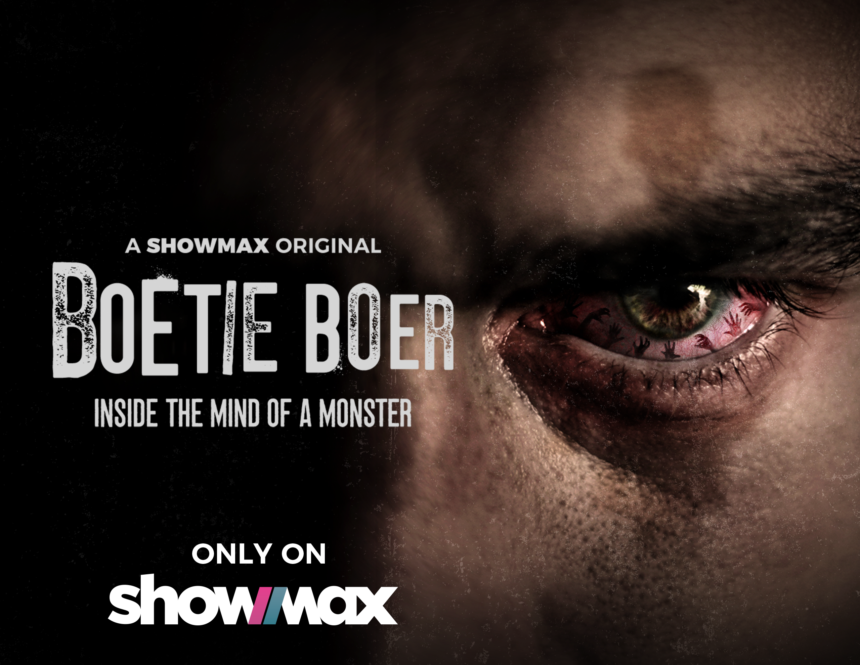The hit Showmax Original documentary Boetie Boer: Inside The Mind of a Monster is available to binge on Showmax from tomorrow, Wednesday, 15 November 2023, having been hailed as “terrifying” (Fortress of Solitude), “spine-chilling” (Jacaranda FM), and “riveting” (Heart FM). As Algoa FM says, “Everyone is talking about it.”
In 1997, Gqeberha fisherman Stewart Wilken was arrested in connection with the disappearance of a 10-year-old boy, Henry Bakkers. While in police custody, he confessed to murdering the child, as well as nine other murders the police had not known about. He was convicted and sentenced to life in prison.
In the Showmax Original documentary Boetie Boer: Inside the Mind of a Monster, Wilken’s seven-year reign of terror is explored against the backdrop of original audio recordings of an interview with the killer himself by Dr Gérard Labuschagne in 2006.
In 1997, when Wilken was arrested, Labuschagne wasn’t part of SAPS yet but was already on his path to becoming involved in criminal psychology. When he first heard about the case, Labuschagne never imagined that one day he’d be sitting in front of the serial killer, having taken over the reins of the Investigative Psychology Unit from Dr Micki Pistorous in 2001.
Podcaster and author Nicole Engelbrecht asks Labuschagne about that meeting and Wilken’s crimes in the excerpt below, from a special episode of True Crime South Africa that accompanies Boetie Boer.
What was the intention behind your and Colonel Jan De Lange going out to interview Wilken in 2006?
As we saw on that TV show Mindhunter, in the early days of the FBI, they tried to understand these types of criminals better, and they decided to go and interview them in prison.
Of course, we’d often interviewed serial murderers in the course of an investigation, but very often you’re doing that with a specific goal – to get the person to confess or point out various crime scene locations, etcetera. So it has a very different purpose. You’re not necessarily going to try to find out about the person’s background and their thoughts as to why they did it.
This interview [in 2006] was intended more to get just that background, his thoughts, and ideas.
The fact that he was already convicted helped. He got many life sentences, so he might be more open to perhaps sharing more. When you’re doing the investigation, he has to worry about, ‘If I say this, how’s this going to affect my trial?’ But going back a number of years later, hopefully any fabrications have passed, to some degree, and he’s had time to reflect on it.
If you ask him a bit more about his personal life, when he gets all worked up in an investigative interview, you have to worry about whether that’s going to get him to stop talking because he’s upset. Whereas in this kind of interview, you can wait, or talk through it with him. You can come back the next day and continue.
So it’s just a different context, trying to get different information that you get compared to doing an investigation interview.
How did you prepare for the interview? Did you need to make sure that you understood the facts of the case beforehand so that you knew when he was lying to you, or did that not matter in this context?
We had copies of the case docket. Historically, the Investigative Psychology Unit obviously knew about the case, and we had his confession, if you want to call it that, as well as background information about his upbringing and statements from his family that were in the docket.
Again, it wasn’t so much about, ‘Tell me exactly what you did during this particular incident! I know you’re lying! Tell me the truth!’ That’s not really the focus. It was about getting more about the background, who he was and what do you think made you do this? What do you think about it now, all these years later?
When you were approached by the production team about participating in the documentary, what were your initial thoughts? How did you feel a documentary like this could add value to the public?
I just think it’s such a fascinating case and a lot of people don’t even know about it. Perhaps it was a generational thing, but there’s value in telling these stories because I think they get forgotten. It’s good that they’re preserved in various formats, especially these older cases, because a lot of people involved are dead, dying, not interested in engaging, or just forgotten. When you have it preserved in this way, it’s like a time capsule.
Something that struck me about Stewart Wilken was that, when he explained his reasoning behind his crimes, there was almost this dual explanation of him seeing himself as both a victim of circumstances, but simultaneously a saviour of sorts, at least when it came to the child victims. He claimed that he was saving the children from experiencing the abuse that he had. Did that come up at all in your interview with him?
I wouldn’t say ‘hero’, as such, but definitely a victim. If you look at the statement he wrote, and there’s also a statement by his adoptive mother, she confirmed a lot of the core issues he mentioned in his actual statement to court about his childhood. He was definitely a victim of a terrible upbringing, but, as you know, many people have similar or worse childhoods and aren’t out there hurting people. I never felt that he saw himself as a hero; definitely as an avenger, against specifically God, who he felt was ultimately responsible for not protecting him. Even when he said, ‘I realised my daughter had been molested’ and he didn’t want her to go through all the things he went through, so he killed her, I guess to him it was maybe a twisted sense of altruism, according to his version of events.
I can’t think of any other serial murderer who jumped around as much as Wilken did in terms of the behaviours he engaged in as well as his victim profile.
There are very few who have committed necrophilia alone or cannibalism only, and I can’t think of any other offenders who’ve done both. In most confirmed cases of cannibalism, there have been significant mental health issues, and that wasn’t the case with Wilken.
I just think it was like an experimentation. Would he have done it again? I don’t know. Maybe, maybe not. He didn’t seem overly put off by what he did when I spoke to him.
Where the victims are concerned, though, I think he just had different types of people that had angered him. He was angry with his previous girlfriend and wife, who he said had cheated on him. So I think that was brewing behind his anger towards adult sex workers.
With the kids, though, it was different. It was almost like he was saying, ‘God, I’m going to show you what you did to me and I’m now going to do it to kids just to punish you.’ The adult sex work worker victims and the child victims definitely had different motives from his point of view.
Boetie Boer: Inside The Mind of a Monster is a co-production between Stage 5 Films and director Jasyn Howes’ Fifth Floor Films.
Watch the trailer:
Add Boetie Boer to your Showmax watchlist:











